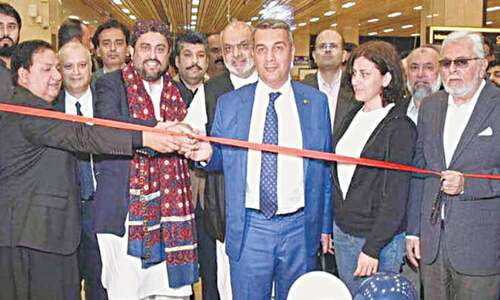KARACHI: Despite growing global concerns over air pollution and the fact that Karachi has been declared the fifth most polluted city in a World Health Organisation (WHO) report released early this year, the government seems to be in no hurry to re-start environmental monitoring stations that have remained idle for the past five years due to lack of funds, it emerged on Sunday.
According to sources, the city has three dysfunctional environmental monitoring stations (EMS); two of them installed at the head office of Sindh Environmental Protection Agency (Sepa) in Korangi and the office of deputy commissioner of district central in North Nazimabad respectively, while the third is a mobile environmental monitoring station.
These systems, they said, were provided to Sepa in Sindh and to other provincial government departments as part of the Rs1.23bn project launched by the Pakistan Environmental Protection Agency in collaboration with the Japan International Corporation Agency (Jica) in 2007.
JICA’s share in the project was 79pc (973m) in the project. The federal government bore 21pc (260m) while the Sindh government was to provide technical assistance and environmental monitoring equipment.
The project’s objective, sources said, was to measure air pollutant levels especially in the city’s industrial zones.
“The stations did carry out air monitoring for some years before they fell into disuse following devolution under which the project was transferred from the federal government to the provincial government without any financial assistance,” said additional director general of Sepa S.M. Yahya, adding that the stations operated till 2012.
The government, he said, now had approved a project to restart their operation. “The budget of the Rs140m project titled ‘Strengthening of environmental management system’ has been approved and the Pakistani representative of the Japanese company earlier involved in the project has been asked to carry out repairs and maintenance of the monitoring systems,” he said.
To a question about the amount required to run these stations and whether Sepa has the technical capacity to run these systems, he said Rs5m was required annually to run them.
“Some staff posted at other stations will be called in, besides a few new appointments would be made in the coming months. Hopefully, air quality monitoring will resume within three months,” he said.
It is noteworthy that Sindh environment minister Dr Sikandar Mandhro while responding to some environmental concerns raised by lawmakers in the assembly, had told the house in Feb earlier this year that the EMS would be operational in a few months.
Fifth most polluted city
According to a 2016 WHO report, Karachi is the fifth most polluted city in the world followed by Peshawar and Rawalpindi.
Thirteen of the top 20 most polluted cities in the world, the report says, are in India. The report ranked 1,600 cities in 91 countries for the quality of their air, which is measured for concentrations of particulate matters (PM 10 and PM 2.5), two major harmful pollutants that can cause serious diseases.
The study, sources said, was not the first report showing the alarming levels of air pollution posing a direct threat to human health. In 2013, an Aga Khan University and Hospital (AKUH) study had linked a striking rise in emergency room visits and hospitalisations for cardiovascular diseases to higher levels of air pollutants in Karachi.
An independent environmental consultant Saquib Ejaz Hussain observed: “Karachi is one of the few cities in the world that has no air quality index, a number used by government agencies to communicate to the public how polluted the air currently is or how polluted it is to become. The air quality monitoring exercises of Sepa were erratic and the agency never analysed or documented its data to predict future pollution levels.”
The government job wasn’t just to monitor air pollutant levels but also to take measures to control them, he said.
Published in Dawn, July 11th, 2016















































